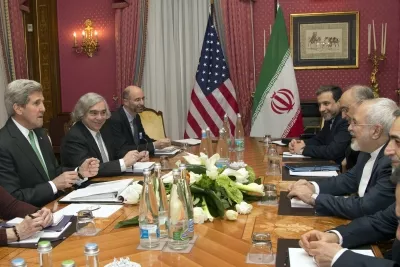Sanctions and Iran’s economy
- The government predicted GDP to grow 2.5% in next calendar year, which begins on March 21. (Tehran Times, 3/10)
- Oil markets fluctuated over concerns that a nuclear deal would trigger flooding of international markets with Iranian oil. (Financial Times, 3/6)
Iranian domestic politics
- Iranian court sentenced Akbar Hashemi Rafsanjani’s son to a 15 year prison sentence, only days after Rafsanjani was defeated in elections for the Assembly of Experts. (New York Times, 3/15; AFP, 3/15; AP, 3/15)
- A UN investigation found that treatment of human rights in Iran has deteriorated even after election of President Hassan Rouhani, who promised reform. (Reuters, 3/16)
- U.N. special rapporteur on human rights in Iran: “There is a lot of concern amongst the Iranian society that the nuclear file may be casting a shadow over the human rights discussion ... My view however is that if there is improvement in terms of the engagement on security issues, there is potential for improvement in other areas as engagement widens.”
- 260 members of the Majles signed a statement urging the government to insist on removal of all sanctions as a precondition for a comprehensive nuclear agreement. However, Majles speaker Ali Larijani insisted that lawmakers would not stand in the way of an agreement, saying that “we don’t have problems like those in the United States.” (USIP, 3/16; AFP, 3/16; Tehran Times, 3/16)
- Ali Younesi, a former intelligence minister and Rouhani adviser, faced harsh criticism for calling for “union” among Iran’s Arab neighbors, which Arab media saw as a thinly veiled reference to the return of the Persian empire: “Currently, Iraq is not only part of our civilizational influence, but it is our identity, culture, center and capital, and this issue is for today and the past. Because Iran and Iraq’s geography and culture are inseparable, either we fight one another or we become one.” Younesi said his comments were misconstrued. (Al-Monitor, 3/10; MEMRI, 3/9)
- Majles is considering bill to reverse falling birth rates by banning voluntary sterilization and state subsidies for contraception. (AFP, 3/11)
- Rouhani’s job approval numbers have fallen since November, when 59% of Iranian approved of his performance. In February poll, 49% approved. (iPOS, 3/3)
US-Iran relations
- See “Diplomacy and nuclear issue.”
- Despite furor among Senate Democrats about GOP letter to Iran’s leadership, Democratic support for Corker bill has not waned, and Republicans believe they are on the verge of a veto-proof majority to pass the bill. (Politico, 3/15)
- White House Chief of Staff Dennis McDonough implored Corker not to hold vote on his bill, writing that “we do not believe that the country’s interests are best served by congressional attempts to weigh in prematurely on this sensitive and consequential ongoing international negotiation.” Corker’s legislation, McDonough wrote, would “potentially prevent any deal from succeeding” and would “potentially make it impossible to secure international cooperation for additional sanctions.” (Letter to Corker, 3/14; Politico, 3/14)
Geopolitics and Iran
- Iranian supplied and controlled Shia militias, accompanied by several thousand Iraqi soldiers, succeeded in retaking most of Tikrit, Iraq, last week. Shia militias dispatched 20,000 fighters to confront ISIL; the effort was coordinated by Quds Force commander Qassem Suleimani and his deputy, Abu Mahdi al-Mohandis, who formally controls Iraq’s Shia militia groups. (McClatchy, 3/12; Long War Journal, 3/12)
- Revolutionary Guard advisers were on the ground advising Shia militia troops, and Iran supplied rocket batteries (mounted on Safir 4x4 trucks), artillery, drones and T-72 tanks.
- Militia forces also utilized American M198 155 mm howitzers and American Humvee’s and MRAP’s.
- The Iranian and Hizballah presence on the Syrian side of the Golan Heights is intensifying to the extent that “parts of the Golan are used as a locus of deniable retaliation for developments involving Hizballah or the Blue Line in Lebanon.” (Lebanon Daily Star, 3/12)
- Saudi Arabia signed a memorandum of understanding with South Korea to study construction of two nuclear reactors in Saudi Arabia over 20 years. (Wall Street Journal, 3/11)
- Prince Turki Al-Faisal of Saudi Arabia repeated his warning that the Kingdom would insist on receiving same terms of deal negotiated with Iran: “I’ve always said whatever comes out of these talks, we will want the same.” (BBC, 3/16)
Israel
- Note: Knesset elections in Israel are scheduled for March 17.
- Former Shin Bet chief Yuval Diskin said Israeli Prime Minister Benjamin Netanyahu’s speech to Congress was “smoke screen for his failures,” noting that under Netanyahu’s leadership Iran developed “six times more centrifuges, 12 times more enriched uranium, heavy water reactor for plutonium, uranium enriched to 20 percent.” (Yedioth Ahronoth, 3/6)
“Red lines,” “points of no return,” and military strikes
- No significant developments.
Uncertain or dubious claims
